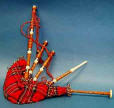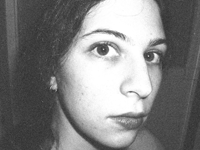It's the day of the big fiesta and like seemingly everyone in Santiago, Maria and I decided to go to the beach.
Almost as soon as the train left Santiago, we were in the countryside. We passed through thickets of evergreens, through towns where each house had its own plot of land with corn and (I think) squash. Some had ancient
horreos that are used to store grain and other things in a dry place.

Maria told me that long ago a new husband and wife would have sex for the first time underneath the
horreo. For fertility -- both theirs and the earth's, I'd imagine. A sort of feedback loop of fertility. Pilgrims with beaten wooden sticks wound their way through the small plots of land, headed towards Santiago.
I looked out the left hand side window as we rounded a curve and suddenly the forest opened out onto a glittering river. The landscape did look sort of mystical, the way galicians always insist it does. I looked out the right hand side window and saw a factory belching out turds of dark smoke.
We arrived in Vilgarcía de Arousa about an hour later. After the beauty of the ride, the beach itself was a bit of a shock. It was sort of like if there were a beach next to the part of the New Jersey Turnpike that's closest to New York. On the left was what I think ws a cement factory. On the right, along the shore, were enormous soviet-looking hotels -- grey cement with small windows and streaks of rust.
But I forgot my camera. Aren't you disappointed?
The sand had a fair amount of garbage strewn around and the water near the shore was choked with seaweed.
But sunshine is sunshine, so we spread our towels on the sand, ate our lunch of canned olives and bread, and took a nap. A little later Maria took out a book to read -- Max Weber's
The Protestant Ethic and the Spirit of Capitalism. A little light beach reading...
A little later I went wading. You could see tiny, almost transparent fish darting back and forth, and live periwinkles clung to clam shells. Further out, you could see larger fish glinting in the sun as they jumped.
We just arrived at the train station to find that the train we thought was arriving only comes on weekdays. But that's OK -- we're eating juicy peaches and taking in the view of the mountains above the cement factory.
 Maria told me that long ago a new husband and wife would have sex for the first time underneath the horreo. For fertility -- both theirs and the earth's, I'd imagine. A sort of feedback loop of fertility. Pilgrims with beaten wooden sticks wound their way through the small plots of land, headed towards Santiago.
Maria told me that long ago a new husband and wife would have sex for the first time underneath the horreo. For fertility -- both theirs and the earth's, I'd imagine. A sort of feedback loop of fertility. Pilgrims with beaten wooden sticks wound their way through the small plots of land, headed towards Santiago.



